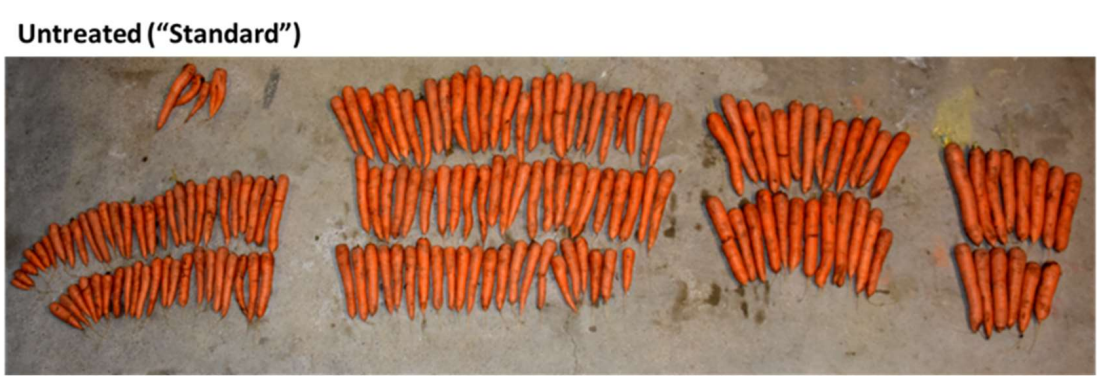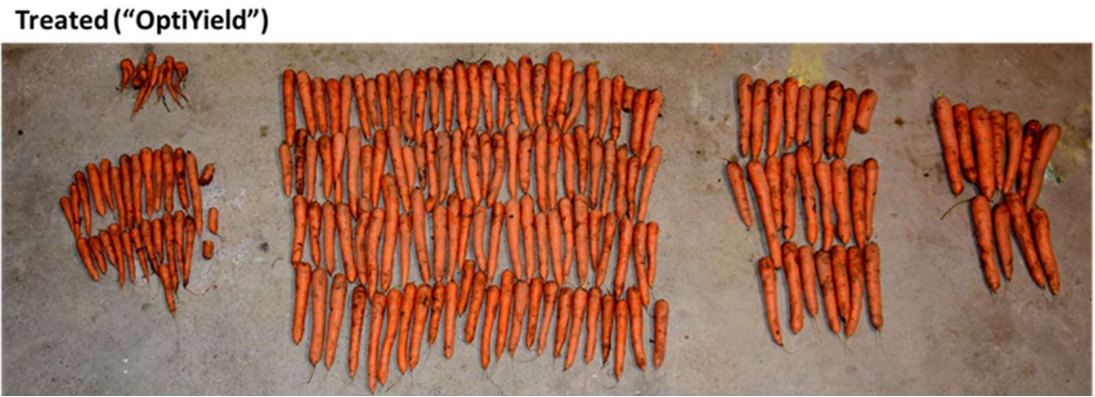The Problem
One of the biggest issues facing carrot growers is waste, and with the United Nations predicting that farmers need to increase food production by 70% to meet the global demand, increasing marketable yield is ever more important.
This is why Emerald Research (ERL), collaborated with a National Root Crop Grower and independent research company NDSM (now a part of Eurofins), to investigate whether a bespoke approach to crop production would have an impact on the percentage of marketable yield.
“There’s no point in having a 120t/ha crop if you have 40% waste,” says Simon Fox, soil scientist and director of Emerald, “if carrots have defects, disease or aren’t the correct size or shape, they are either wasted or have to be used for processing, which has a much lower price tag,” he says.
With that in mind, the company joined forces with a National Root Crop Grower to run a series of trials on Emerald’s flagship crop production system, OptiYield.
“OptiYield is a total crop performance software system used in-house to generate full crop lifecycle programmes of nutrients, biostimulants and microbials. These are tailored to the intended crop and market to enhance crop growth, health, quality and performance,” says Simon, “we found the OptiYield programme delivered a number of positive results in this series of trials,” he says. “Firstly, it decreased cavity spot incidence in the carrots, which we ascribe to theplants being more vigorous and healthier, meaning they’re less susceptible to disease. Secondly, there was a greater volume of carrots of marketable size and quality, due to a significant increase in overall yield and uniformity of the carrots.”
The Trials
“It was evident from these very early trials that the OptiYield system worked,” says Ben, the Farm Manager, “Simon shared his data with us, and it went from there.” The project started in earnest with replicated small plot trials on light sandy soils using the Nairobi variety.
Based on the successful outcome of these trials the project continued with field trials, both half field and adjacent strip comparisons. “We earmarked a 50-acre field and split it into three sections. One had the full OptiYield programme, the second a competitor trace element and the third just had the farm standard crop nutrition. In this particular trial OptiYield outperformed the other plots with a significant yield increase,” says the Farm Manager.
This progressed to full-scale commercial applications in fields throughout the UK cropping area.
“2018 was a very hot year for us and we were struggling with drought and the resulting stress this was causing the crop. However, in the fields where we used the OptiYield programme, the crop was healthier and less stressed than the farm standard fields.”
The Results
- Significant increases in Marketable Yields of 18 to 22% across all
independent trials - Significant decrease in Cavity Spot
incidence - Lower levels of heat & drought stress in hot years
Significant increase in Net Margins
“The plot trials over two years demonstrated significant Gross yield increases when the full OptiYield programme was used, with an average of 12 to 15% Gross yield increase across all of the independent trials,” explains Simon, “when we visually examined the crops, we found that rooting was also increased and there was a significant (40%) decrease in cavity spot, specifically Pythium cavity spot. Marketable yields increases were between 18 and 22% as a result.
This was particularly apparent in the first trial year, where we saw a reduction of cavity spot by 50% in the treated areas,”he says. “This is especially important as carrots affected by cavity spot aren’t saleable, so overall marketable yield was


